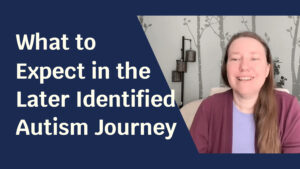Masking is incredibly common among autistics
I won’t go so far as to claim that all autistics mask (or camouflage, or hide), because some don’t, or can’t, or (as I did/am doing) have healed enough of the traumas and old wounds that created the masking in the first place that we have more choice in the matter and are unmasking more and more.
I still mask by default sometimes, and I choose to sometimes, but less with every passing year.
How can you tell if you’re masking?
I started tweeting about masking after having the same conversation with client after client, in which they asked me about masking and I was like, do you do this? or this? or this? and they’d nod fervently and sigh in relief that they’re not the only “weirdo” out there.
The conversation played out so many times that I started wondering how many of us there are that do these “weird” things and think we’re the only one.
So this is a collection of examples, often from my own life, in which I noticed that I was hiding my real self, reactions, feelings, desires, needs, etc. in order to gain safety, acceptance, acknowledgment, be taken seriously, to avoid attention, punishment, harm, etc. (more so than being polite or socially acceptable), or situations that were the results of a lot of that hiding, even when no other people were involved.
As you read these, it is important to keep in mind that all of these masking examples can be the result of trauma, social anxiety, rejection sensitivity, or have other influences that aren’t masking. Also, trauma is one of the things that creates masking, social anxiety, rejection sensitivity, etc. They aren’t entirely separable.
On high masking
High masking is what I’ve been calling it when you are so used to masking/pretending/camouflaging/hiding your struggles in order to pass as “normal” or avoid attention, often to feel safe, that your real struggles and needs are not noticed and may be discounted when you bring them up.
I was frustrated with the term “high functioning,” and hoped to emphasize how some of us mask/pretend/camouflage/hide our struggles so skillfully that others don’t see or acknowledge them.
It’s not a different type of masking, rather a description of how much one is using it, or how skillfully, or how deeply internalized it can get.
Some people love the term, and some have expressed concerns that it may create divisions within the community. I think that’s a fair concern. I’m not committed to it; I’ve largely returned to just using “masking.” But since the tweets below contain #highmasking, I wanted to explain.
Also, to clarify, masking and high masking are verbs. They are things some of us do, not who we are. I see them as descriptions of how I sometimes get by in the world (whether consciously, intentionally, or not), not a label of who I am. What I mean is, I am not a “high-masking autistic,” as if that were an identity; rather, I am an autistic who masks extensively.
So, without further ado, here are the first 20. More in part 2 here.
Which of these do you resonate with?
You might be masking if…
(BTW, the pics are embedded links to Twitter, so you can click on them to like, comment, or read the comments if you choose.)
You might be masking if you seem on paper like you’re doing well in life, but are always struggling with commonplace tasks.
You might be #HighMasking if you seem on paper like you’re doing well in life, but are always struggling with commonplace tasks.#ActuallyAutistic #AutisticTwitter #ADHDTwitter #AuDHD #Neurodiversity
— Heather Cook 🦓🖖Autistic Life Coach (@hmm_cook) November 7, 2022
You might be masking if you’re worried people won’t believe you when you tell them you need accommodations, because “you didn’t need them before.”
You might be #HighMasking if you’re worried people won’t believe you when you tell them you need accommodations, because “you didn’t need them before.” #ActuallyAutistic #AutisticTwitter #ADHDTwitter #AuDHD #Neurodiversity
— Heather Cook 🦓🖖Autistic Life Coach (@hmm_cook) November 7, 2022
You might be #HighMasking if you’re running late and spend the entire time coming up with the most acceptable excuse and rehearsing it, then splutter it out as if you had come up with it at that moment.
You might be #HighMasking if you’re running late and spend the entire time coming up with the most acceptable excuse and rehearsing it, then splutter it out as if you had come up with it at that moment.#ActuallyAutistic #AutisticTwitter #ADHDTwitter #AuDHD #Neurodiversity
— Heather Cook 🦓🖖Autistic Life Coach (@hmm_cook) November 8, 2022
You might be #HighMasking if you finally manage to do the household chores when you’re home alone, or when everyone else is asleep.
You might be #HighMasking if you finally manage to do the household chores when you’re home alone, or when everyone else is asleep.#ActuallyAutistic #AutisticTwitter #ADHDTwitter #AuDHD #Neurodiversity
— Heather Cook 🦓🖖Autistic Life Coach (@hmm_cook) November 9, 2022
You might be #HighMasking if you go well out of your way to avoid people in common spaces so that you don’t have to use up your energy on greeting them appropriately.
You might be #HighMasking if you go well out of your way to avoid people in common spaces so that you don’t have to use up your energy on greeting them appropriately.#ActuallyAutistic #AutisticTwitter #ADHDTwitter #AuDHD #Neurodiversity
— Heather Cook 🦓🖖Autistic Life Coach (@hmm_cook) November 9, 2022
You might be #HighMasking if you mentally divide people into “family,” “work friends,” “school friends,” “people I have to deal with,” and “random people.”
You might be #HighMasking if you mentally divide people into “family,” “work friends,” “school friends,” “people I have to deal with,” and “random people.”#ActuallyAutistic #AutisticTwitter #ADHDTwitter #AuDHD #Neurodiversity
— Heather Cook 🦓🖖Autistic Life Coach (@hmm_cook) November 10, 2022
You might be #HighMasking if you need to get someone’s attention and you stage something happening so they’ll look up, and they just happen to notice you, so then you can talk to them.
You might be #HighMasking if you need to get someone’s attention and you stage something happening so they’ll look up, and they just happen to notice you, so then you can talk to them.#ActuallyAutistic #AutisticTwitter #ADHDTwitter #AuDHD #Neurodiversity
— Heather Cook 🦓🖖Autistic Life Coach (@hmm_cook) November 10, 2022
You might be #HighMasking if someone asks you what you need/want and you genuinely have no idea.
You might be #HighMasking if someone asks you what you need/want and you genuinely have no idea.#ActuallyAutistic #AutisticTwitter #ADHDTwitter #AuDHD #Neurodiversity
— Heather Cook 🦓🖖Autistic Life Coach (@hmm_cook) November 11, 2022
You might be #HighMasking if the doorbell ringing triggers immediate panic, moving into grief over your lost alone time, and then resignation to unexpected people time.
You might be #HighMasking if the doorbell ringing triggers immediate panic, moving into grief over your lost alone time, and then resignation to unexpected people time.#ActuallyAutistic #AutisticTwitter #ADHDTwitter #AuDHD #Neurodiversity
— Heather Cook 🦓🖖Autistic Life Coach (@hmm_cook) November 11, 2022
You might be #HighMasking if someone offers you a drink and you desperately want it but say, “no thanks, I’m good.”
You might be #HighMasking if someone offers you a drink and you desperately want it but say, “no thanks, I’m good.”#ActuallyAutistic #AutisticTwitter #ADHDTwitter #AuDHD #Neurodiversity
— Heather Cook 🦓🖖Autistic Life Coach (@hmm_cook) November 12, 2022
You might be #HighMasking if your doctor won’t believe you because “you don’t look like you’re in that much pain.”
You might be #HighMasking if your doctor won’t believe you because “you don’t look like you’re in that much pain.”#ActuallyAutistic #AutisticTwitter #ADHDTwitter #AuDHD #Neurodiversity
— Heather Cook 🦓🖖Autistic Life Coach (@hmm_cook) November 12, 2022
You might be #HighMasking if you need to talk to someone and would rather wait patiently (on edge) for an hour for them to finish a conversation or to take a natural break rather than interrupt politely.
You might be #HighMasking if you need to talk to someone and would rather wait patiently (on edge) for an hour for them to finish a conversation or to take a natural break rather than interrupt politely.#ActuallyAutistic #AutisticTwitter #ADHDTwitter #AuDHD #Neurodiversity
— Heather Cook 🦓🖖Autistic Life Coach (@hmm_cook) November 13, 2022
You might be #HighMasking if you spend two days preparing to answer the question, “how was your weekend?” as casually as possible.
You might be #HighMasking if you spend two days preparing to answer the question, “how was your weekend?” as casually as possible.#ActuallyAutistic #AutisticTwitter #ADHDTwitter #AuDHD #Neurodiversity
— Heather Cook 🦓🖖Autistic Life Coach (@hmm_cook) November 14, 2022
You might be #HighMasking if you say, “excuse me,” for burping, farting, or bumping into something when you are all alone.
You might be #HighMasking if you say, “excuse me,” for burping, farting, or bumping into something when you are all alone.#ActuallyAutistic #AutisticTwitter #ADHDTwitter #AuDHD #Neurodiversity
— Heather Cook 🦓🖖Autistic Life Coach (@hmm_cook) November 15, 2022
You might be #HighMasking if you freeze, clam up, go blank, etc. when someone asks about a project that’s still in progress, or walks in on you when you’re working on it.
You might be #HighMasking if you freeze, clam up, go blank, etc. when someone asks about a project that’s still in progress, or walks in on you when you’re working on it. #ActuallyAutistic #AutisticTwitter #ADHDTwitter #AuDHD #Neurodiversity
— Heather Cook 🦓🖖Autistic Life Coach (@hmm_cook) November 16, 2022
You might be #HighMasking if you chat with strangers in elevators, even when you really don’t want to, to avoid coming across as rude to someone you will never see again.
You might be #HighMasking if you chat with strangers in elevators, even when you really don’t want to, to avoid coming across as rude to someone you will never see again. #ActuallyAutistic #AutisticTwitter #ADHDTwitter #AuDHD #Neurodiversity
— Heather Cook 🦓🖖Autistic Life Coach (@hmm_cook) November 16, 2022
You might be #HighMasking if one person being nice when you use a fidget toy or wear headphones is a HUGE relief.
You might be #HighMasking if one person being nice when you use a fidget toy or wear headphones is a HUGE relief.#ActuallyAutistic #AutisticTwitter #ADHDTwitter #AuDHD #Neurodiversity
— Heather Cook 🦓🖖Autistic Life Coach (@hmm_cook) November 17, 2022
You might be #HighMasking if you mentally divide your schedule into “people time“ and “not people time.“
You might be #HighMasking if you mentally divide your schedule into “people time“ and “not people time.“#ActuallyAutistic #AutisticTwitter #ADHDTwitter #AuDHD #Neurodiversity
— Heather Cook 🦓🖖Autistic Life Coach (@hmm_cook) November 18, 2022
You might be #HighMasking if you can hyperfocus and be super productive some days, and other days absolutely nothing gets done, and either way you apologize.
You might be #HighMasking if you can hyperfocus and be super productive some days, and other days absolutely nothing gets done, and either way you apologize.#ActuallyAutistic #AutisticTwitter #ADHDTwitter #AuDHD #Neurodiversity #autisticmasking #AutisticBurnout
— Heather Cook 🦓🖖Autistic Life Coach (@hmm_cook) November 18, 2022
You might be #HighMasking if you’re walking down the street and mentally measure how far you are from a stranger you’re passing to gauge when to smile and nod politely and look disinterested again.
You might be #HighMasking if you’re walking down the street and mentally measure how far you are from a stranger you’re passing to gauge when to smile and nod politely and look disinterested again.#ActuallyAutistic #AutisticTwitter #ADHDTwitter #AuDHD #Neurodiversity
— Heather Cook 🦓🖖Autistic Life Coach (@hmm_cook) November 19, 2022
Which of these do you resonate with? More in part 2 here.
Here’s a thought to leave you with:
“I’m not saying that your efforts to fulfill cultural standards are bad. Quite the opposite. You’re doing a Herculean job of living up to standards you truly believe are right and good. I admire that very much. It takes incredible self-discipline to go against your nature. If I scolded you about this effort, I’d just be administering another dose of punitive socialization. I’m not condemning you in the slightest. But I do want you to notice one thing: whenever you go against your true nature to serve your culture, you freaking hate it.” ~Martha Beck, The Way of Integrity




